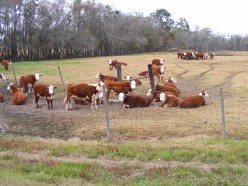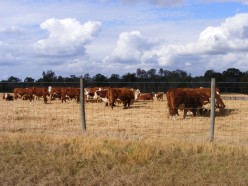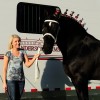US to start Slaughtering Horse for
Horse slaughter policy in America has entered a new era as the Department Of Agriculture has quietly reinstated what was shut down in 2007. That was when the last horse slaughter plants in the U.S. shut down and now the President has signed the bill to allow for federal funding.
The thought of these gorgeous animals being sent to the slaughter house just make me so angry. Horses are sensitive animals and you cannot tell me the horse at the slaughter plant cannot smell the blood ass they enter their fate. They're freaked out. They know death is coming, And honestly the thought of eating a horse is repulsive. A very very good friend of mine is a horse rescuer and the more I watch her and these animals the more repulsed I am feeling today.
Supporters of the bill see a different side just like Sue Wallis told The Oklahoman back in November, "everyone in the horse world is so excited we may have an opportunity to turn the whole equine market around."
Is she kidding. .who is everyone in the Horse world?
Read more:
Horse Slaughter Ban Lifted: Congress Reinstates Federal FundingWhen she is referring to everyone in the horse world, she is referring to just about everyone involved in the horse industry. Have you ever owned a horse? Do you have any idea what's been going on in the U.S. horse market in the past 5 years? Do some research before you write this off as a bad thing.
i too was against horse slaughterhouses. i have since realized that we NEED them. when the last one closed down, it was disaster for so many horses. with hay costs rising so high it became nearly impossible to keep one and many owners were forced to sell their horses...only no one wanted to buy them...they would even offer horses free to good homes and still no takers. i myself already had 2 but i took on a third. but i could do nothing for the hundreds that were dumped up in the black hills or here on our reservation. in the mountains we have mountain lions and other predators...and way to many cars. it is bad enough to hit a deer at night...but it is almost always fatal to both the motorist and the horse (or cow) when you hit one of them...i know, ppl let their livestock out on the roads here all the time and people are always getting killed for hitting one.
the benefits of horse slaughter, some of which have been said already below me, is that unwanted horses have a place to go and their death is mostly humane...a far better death than starvation, caught by a mountain lion or other predator or being hit by a vehicle. i do think they need regulating and new laws passed to prevent anyone from buying a horse without some kind of proof of where they are being taken...(but then sellers can ask for referrels, that would help).
as for eating horse meat, i heard a rumour it may well be in markets here in the usa soon enough if the price of beef continues to go so high it no longer is affordable for low income families.
i love all animals. but i am a realist as well. i have raised and killed and eaten chickens and rabbits. GOD gave man dominion over the animals. that does not give us the right to abuse or neglect or harm them without cause...but it does give us the right to eat what we need. the problem with humans is that they are greedy and think only of their own pleasures. if they were to suffer even half the pain and fear they caused animals they might be more compassionate towards them.
in the end horse slaughter, while not a pleasant idea...is needed.You know what creates a massive supply in the market that exceeds demand? Breeding 100 horses a year to get 10 good ones, then dumping the rest. These horses did not materialize out of thin air, they were bred and created by someone. Maybe by someone who thought their horse was so pretty, or their kids needed to witness the miracle of birth, or someone had inadequate fencing, or someone doesn't "believe" in gelding their horses because that would be "against nature".
Did you know that there is still a market for high quality horses? I know a couple with a $2M price tag. I know several with a price tag in the high twenty thousand range.
You know what we don't have a market for? Backyard bred fuglies with no pedigree, no training and no handling that get dumped at an auction because their owner is too lazy/cheap to take the time to find a decent home.
You know how a chicken or rabbit is killed? Take the head off. Know how cows are killed? Captive bolt gun to the head then a slit throat while they are unconscious. Know how horses are killed? Same captive bolt gun to the head, then they wake up about 20 seconds later while they are strung up, bleeding to death and having their legs chopped off.
Did you know that horses have twice the blood volume of cattle per pound as well? What do you think they do with all that blood? It gets dumped into the water.
Did you know that many if not most of these horses being sent to slaughter have been given a cocktail of chemicals throughout their lives including a worming past 6 times a year that specifically says "not intended for use in animals intended for human consumption"
Horse meat is a by product of people being irresponsible. Occasionally you find a down on their luck former show horse with a pedigree and championship behind their name. But for the most part it's untrained, unhandled youngsters that were bred to make someone rich that wasn't smart enough to realize that there is no money in horse breeding.
The source is irresponsible breeding. Excess horses is a symptom of this. You can send all the unwanted horses to slaughter and in the end there will always be excess horses.
We have millions of unwanted cats and dogs in this country. They are euthanized and the bodies incinerated. Why don't we have some slaughter plants so we can ship dog and cat meat overseas as well?
I do NOT believe in animal rights. I believe that animals have a right to exist without pain and cruelty, with adequate food, water and space followed by a quick and painless death. Horses get sold at an auction, loaded onto a double decker trailer and then shipped to Canada or Mexico for processing. They get bashed in the head, strung up and are usually awake while hanging from a hook being processed.
These animals are not raised for slaughter. They are raised (mostly) to work with people. They are (generally) handled carefully and (usually) treated well. To go from a home where they are loved and cared for to getting crowded onto a double decker where they get kicked, trampled, injured and killed prior to the delightful death waiting for them at the slaughter plant IS traumatic for a horse.
http://www.vetsforequinewelfare.org/hum … anasia.php
If this was humane I wouldn't take an issue with it. If this was happening for a reason other than people are being irresponsible and breeding everything with a uterus or testicles, I might not be so upset.I forgot to mention also the older, broken down horses that have spent their lives teaching little kids to ride, bringing their owners to show, working every day for their owners that can't anymore. Retirement board is too cheap and they are too "attached" to the horse to put it down and bury it, so it goes to auction and from auction it goes to slaughter.
That's an end I don't think Anna Sewell considered at the end of Black Beauty.as i said before...horse slaughter houses are an unpleasant but needful service. regardless of all the reasons why we have unwanted horses...the fact is we DO have them and we WILL have them...until people become responsible for their animals we will always have unwanted felines, equines and canines...not to mention so many other animals. i most certainly do not like knowing horses were and probably will be again raised for no other purpose than to go to slaughter, like cows...but i do know that if there is a market for horse meat anywhere in this world...then this will happen. as i said before that man looks out for his own pleasure and that pleasure is best met with money in the pocket. i.e. greed.
someone mentioned letting temple grandin rebuild horse slaughter houses. while she did a great job for cattle...that is because she understood them. if she can do the same for horses that would be ideal indeed...if not surely there is someone out there who can..wavegirl22...if you have a better answer by all means share it. criticizing the answers of others just because you disagree with them, but not giving any reasons for your criticism just tells me you don't have much knowledge or maturity or both. you are responding with your emotions and not your GOD given ability to reason things out or be realistic.
I understand where wavegirl is coming from - it IS an emotional issue for many horse lovers/owners. I am, however, trying to use reason along with my personal emotions. I am very knowledgeable about horses and slaughterhouses. I've owned many horses, bred horses, and trained horses. I've also raised cattle and pigs and have been in slaughterhouses. I worked hard to help get kill houses in the U.S. closed, which I now think was a mistake. American horses are now being subjected to worse conditions than they were in U.S. kill houses.
What I'm saying is that IF it's going to be legal to kill horses for meat, we need to do it in the most humane way possible. The chances of that happening will be MUCH more likely in the U.S. than in uninspected Mexican kill houses.
katesaidan, you make a lot of claims and don't cite any sources? Where are you getting this information? (I'm referring to the horses "waking up" from having a bolt thrust into their brains and the dumping of the blood into the water supply.)
I think she's referring to the non-penetrating bolt gun. If so, she's right - horses are usually unconsious for less than a minute. Of course, with a penetrating bolt gun or a bell gun, this usually isn't a problem. I sincerely hope than when U.S. horse slaughterhouses re-open, they use the penetrating gun. Some slaughterhouses don't like to use the penetrating gun because it stops the heart from beating, reducing the effectiveness of the "bleeding out" process.
___________________
Although I would never eat horse meat and I would hate it if the US allowed it, Canada has been eating it for years.
In Canada, horse meat is a very common meat.
There are worse fates for unwanted horses than slaughter. If they made slaughter illegal they needed to provide alternatives as many (most?) current owners either cannot afford or do not have access to veterinary euthanasia with barbiturates and carcass disposal (running $1000-$5000 depending or horse size and geographical location).
if you were in a restaurant would you order Horse for dinner?
This is relevant how?
I think we should run society in a way that is fair to the most people and kindest to animals--or at least make changes moving in that direction.
I don't think banning slaughter is fair to those that do eat horse (like tigers in zoos) or kind to horses that will be left to suffer or shipped long distances and slaughter by less humane methods.
Making rules based on my person level of disgust or warm fuzzies might meet my needs, but I wouldn't expect anyone else to support it.Why is eating meat from a horse any worse or better than eating meat from a cow or a pig? Eating horse in Europe is not uncommon - I suppose that’s why glue is so cheap here.
Cows and pigs aren't usually companion animals. I hate the idea of horse slaughter. For one thing, it's hard to render one unconscious from a captive bolt gun like they do with cows and pigs, as a horse's brain is situated differently.
If, however, horse slaughter is going to be legal, it's better to be done in the U.S. instead of in Mexican kill houses that have no regulations. There, the back of the horse's neck is sawn into with a knife. The horses also have to travel without food or water - sometimes for days - in cramped trailers from the U.S. to Mexico.
BTW, I've written several hubs about this topic.
Those who have never had a close relationship with a horse will never understand how some of us feel. To me, killing a horse for food is the same as killing and eating your pet dog. I've had horses that were as docile and affectionate as any dog.Habee have you done any research on the effectiveness of the captive bolt gun used in slaughterhouses? If so, could you cite your sources, I'd like to look at them because I got some different answers than you did.
The captive bolt gun's use on cattle? Pigs? Horses?
No for mostly all of us, otherwise there would be a lot more horses being slaughtered.
There are innocent humans being slaughtered on a daily basis, we can't even get that solved.
Hi Habee. True, I have never had a relationship with a horse so I don’t really understand the companion aspect. That said though, if I did have an equine friend how does that relationship extent to every horse?
How do you feel about killing dogs for their flesh? Like I said, if horse slaughter is going to be legal, it should be done with regulations in place. Many horse owners in the U.S. have sold their animals to kill buyers unknowingly. They thought the horses were going to a good home, when instead, the equines were shipped to Mexico to be killed for their meat. A very few horse slaughterhouses in Mexico are regulated by the EU, but in those that aren't, the conditions are atrocious - worse than any slaughterhouse in the U.S. Have you ever been in a slaughterhouse? I have.
Horse, dog, pig, squirrel...it doesn't matter. If the critter is going to be killed for its meat, it ought to be done as humanely as possible.
My family raised a few chickens last year, to see if keeping chickens was something we'd like. I became attached to them. Alas, the zoning laws in our town kept us from keeping the birds, so we gave them to a friend who had an established flock. I was sad to see them go. But I still eat chicken. And I'd have eaten our chickens, too, when the time came. But I'd have made sure to kill them quickly, and with as little suffering as possible.
Many people around the world eat dog. Some even eat iguana, which would never have even occurred to me.Jeff, I couldn't eat an animal I had become close to. I know some people can, and that's legal. But the animal deserves a quick death that's as painless as possible.
I think everyone agrees on that.
I would argue that physical destruction of the brain with a bullet is legal and is quick.
Horses are, generally speaking, very large animals so training them from a very young age is critical. There are many places where youngsters are born and never handled until it's time to put them on a truck to auction (where they will most likely go to slaughter - no one wants an unhandled three year old) but I would say that those places are the exception, not the rule.
So you have an animal that has been handled by humans for the entirety of their existence, in many cases having a working relationship several hours a day for every day of the week for years on end. This is very similar to having a dog in your home that wags their tail and goes for walks with you.
Horses do know their owners and I believe a study was recently done that horses will actually remember their past owners years later. My previous horse recognized my car and would come to me when I called him. Just like a dog these animals are intelligent and sensitive. They have been bred for centuries to work with man and they have. For a horse that has been raised like this the trip to the slaughterhouse is especially traumatic.
Do you think the Europeans and the Japanese are eating horses that have been fed wormers, given rabies inoculations and other chemical injections?
Here's one written by veterinarians:
http://www.vetsforequinewelfare.org/hum … anasia.php
I also base my opinions on what I've been told by slaughterhouse workers.http://www.avma.org/issues/animal_welfa … anasia.pdf
Please see page 34, it states under Acceptable Methods of Euthanasia, and I quote "Agent: Penetrating captive bolt
Classification: Physical damage to brain
Mode of action: Direct concussion of brain tissue
Rapidity: Rapid
Ease of Performance: Requires skill, adequate restraint, and proper placement of captive bolt
Safety for Personnel: Safe
Species Suitability: Horses, ruminants, swine
Efficacy and comments: Instant loss of consciousness, but motor activity may continue"
So, it is not the fault of the captive bolt gun itself, but the person using it.That's for a penetrating captive bolt gun, right? Read this:
http://www.manesandtailsorganization.or … e_bolt.htmYes, and someone using a gun could miss and take out your knee and instead of shooting you in the head. It's not the gun's fault you're in excruciating pain, just like it's not the bolt gun's fault that the horse is in excruciating pain watching blood pour out of it as it's legs are cut off. Yeah, no problems there.
I would not be happy if I sold a horse that I thought as going to a good home only to find it was sent to slaughter.
As far as eating dog is concerned, I have eaten dog while in Vietnam.I look at this from a homesteading and horse owner standpoint. Horses are pets, but they are livestock first. Horse meat, from what I gather, is pretty good.
If I ever came to the point of not being able to properly care for my horse (I don't have one now but have had), I wouldn't hesitate to slaughter it for meat.
I wouldn't want to eat someone else's horse because of all the medications people pump into them. I'm pretty organic and my horses would be too.
Cattle are just as affectionate as horses, as are pigs. I have been around too many different types of livestock to think a horse should be treated in a special manner. As long as the slaughter is done humanely, then I see no problem with it.
A quick death is better than starving to death in a field. There is a lot of that going on in the past few years.
It is sad to see someone who loves their horse have to kill it, but that is life. I would rather spend charity money to feed the starving kids in my country than to save someone's cast-off livestock.
You have to be pretty straightforward when farming and ranching, that is just how life is. Only the rich can afford to throw their money away. Healthy horse meat is wonderful for dogs (especially working dogs that people rely on to keep their livestock safe), cats and other carnivores.
I would order horse meat in a restaurant, if only just to try it out. Meat is meat. :-)
I would never tell a farmer, rancher or individual they cannot kill or sell or consume an animal they own. That would be like starving them. The sale of the horse will buy food, clothes and pay rent for these people. It can also go to feed their other livestock.
I feel the same way about dogs and cats too. If you want to eat Fido and Fluffy, just kill them quickly. I'd only eat them if I were starving though.
Yuck.Humane slaughter is a big point with me. Horses are harder to kill with a non-penetrating captive bolt gun than other meat animals are. Most slaughterhouses use this type of gun now, due to the penetrating bolt gun's potential to spread BSE.
As far farming and ranching, all farmers and ranchers aren't equal. I've been part of large cattle operations and pig farms, but our animals weren't treated like those in huge feedlots are. Ours had acres and acres of pastures, shade trees, ponds, and streams. When they were sent for slaughter, they only had to ride for about 20 minutes to the slaughterhouse.


Both of the sites that you have based your information from are biased against slaughter. They are not going to tell you that it is an acceptably humane method, as stated by the AVMA because they want you to share their views on the matter. They are going to cite studies based on other organizations/research that are against slaughter. Citing reputable sources is very important when researching a topic, you must always be wary of bias.
Furthermore, you are referring to a non-penetrating captive bolt gun, not a penetrating captive bolt gun, BSE is not a disease spread to horses.
The first source was from veterinarians. Penetrating bolt guns aren't used in most Mexican horse slaughterhouses - unless they've begun using them in the last couple of years. I'm referring here to plants that aren't regulated by the EU, which includes most of the Mexican plants.
From what I can find, penetrating captive bolt guns aren't used for any type of commercial slaughter now - only for euthanasia. I think the penetrating bolt destroys the part of the brain that controls the heart, and the heart needs to beat in order for the animal to "bleed out" properly.
I asked you this before, but you never answered: Have you ever been inside a slaughterhouse?Captive bolts are used pretty routinely. But a bolt or a bullet is basically the same and that is what will be used in the US.
I really don't see the killing as a humane issue if done according to guidelines. Transport is more of a problem.A bolt and a bullet are NOT necessarily the same. There are different types of captive bolt guns. A non-penetrating bolt gun is not very efficient on horses. In the UK, they won't use bolt guns to kill horses - they use bell bullets.
If you've never been in a slaughterhouse and witnessed the killing firsthand, you'll never fully understand the process.
No I've never been to a slaughterhouse and I don't feel that everyone has to go and see one to "understand the process." It's a simple process that doesn't go the way it is planned probably less than 5% of the time. I'm not talking about rural slaughterhouses in Mexico, I'm talking about how currently regulated slaughterhouses, and the ones in the U.S. were operated when they were open.
As for the method of slaughter, it could use some work. There is room for improvement in the design of slaughterhouses. Using Temple Grandin's research is a good launching point. I think that with the repeal of the ban, will come the repeal of the ban on penetrating captive bolt guns.
Regarding drug contamination of the meat, if it's going to be eaten by humans overseas, it's going to be tested. Not all of it perhaps, but they do test.I hope you're right about repealing the ban on penetrating bolt guns. Maybe the US should follow the UK's lead and use bell guns. I don't know, though - a couple of horses have been reported to have a form of BSE. I hope it's not true.
Temple's methods are admirable, and I wish ALL slaughterhouses would follow them. The slaughter process isn't as "simple" as you might think. If you've worked with many horses, you know that many get spooked easily, and when they do, they're hard to handle. The animal needs to be still for the kill to be done quickly. Also, animals in slaughterhouses are beaten, kicked, and shocked to get them moving in the chutes. Of course, some slaughterhouses and workers are more humane than others.
Shelby, I hate the idea of killing horses, but I agree with you that if it's going to be done, I prefer it to be done on American soil. BUT...the killing and handling methods should be improved, and hopefully, they will be.
I know unwanted horses are a major problem now. People are always trying to give me a free horse. I agree with some other posters that a quick death is preferable to the slow death of starvation. I think you and I are basically on the same page - at least we're both concerned about the welfare of horses.I think with the ruckus that has been raised, they won't have a choice in whether or not they improve their conditions. I hope they will go through a thorough screening process to find personnel that are qualified and understand horse behavior. Horses can be difficult. Often out of fear, and seldom out of spite. This concept is difficult for some to understand.
Have you seen any of her designs? They're quite ingenious in my opinion.
No one is forcing a person to send a horse to slaughter if they don't wish to, any more than those with a pet lamb or pot belly pig. these species are all sometimes companions, sometimes workers, sometimes feral, sometime production animals. Physical euthanasia, when properly performed, is instantaneous and humane. In fact, I see no real scientific or ethical reason to make it illegal kill a horse by this method, or to subsequently eat it. And I do worry about what is happening to horses owned by people who do not have access to pentabarb euthanasia.
Horses in the U.S. aren't raised for slaughter, and they're often given drugs that you wouldn't want to consume.
I said "production", pregnant mare urine etc. Plenty of horses, probably most that are born each year are involved in an industry and are not pets. racing, eventing, even farmwork. These are the majority of the 100,000 each year that go to slaughter.
What about people who think they are selling their horse or pony to a good home and - oops - that was actually a kill buyer who LIED to you to get your horse and then sell it for me. Or people who are forced to send their horse to auction and the horse gets picked up by a kill buyer? No choice there either.
People don't wake up one day and say "Golly, how much is my horse worth per pound" and get on the phone with a kill buyer. Either the kill buyer makes a good show of "I want you horse for my spouse/children/grandchildren" and they were a lying sack of steaming poo and were actually going to kill or the kill buyer picks up the horse at auction.I have never met a kill buyer this unscrupulous. Anyone who goes to an auction and doesn't figure out who the kill buyer(s) is/are, has not done their homework.
If you cannot handle the reality that all things die, you should not go into owning an animal.It's not always easy to spot the kill buyers. A few are very sneaky at auctions. I've seen them get their partners to buy horses so that it won't look like a single buyer is buying numerous animals.
Also, Shelby, I think the key issue is HOW the animals die - not THAT the animals die.
What do you think about the proposals for gelding clinics and horse rescues that I mentioned in a former post?Well, you have a point there, I'm not saying I wouldn't be upset if I had a horse sell to kill in Mexico, but I have never heard a first hand story of a kill buyer telling the seller the horse is going to a good home. On the same note would you really want to know that your horse was going to slaughter after there was nothing you could do about it?
On the matter of the gelding clinics, most everyone I know (this is in the draft industry) will geld studs that they don't think are good enough to breed. Now some hold their stock in higher regards than others and even when they should not be bred, people will breed them anyway. Usually this is to their own stock and other mares of the same quality. So you could have these clinics, yes, but it would be a matter of convincing people with poorer quality animals that they should not breed them. For those who just can't afford the procedure I would have to question whether they could even afford the horse in the first place. It's a good idea but for a select group.
Yet another reason people should try and raise their own food. Smaller scale usually means better taken care of livestock. And you know what is in your food that way.
According to Dr. Lester Friedlander, a vet who used to be Chief USDA Inspector, a horse's brain does not repond the same way as a cow's brain does to a captive bolt gun. He says horses are usually unconscious for only 30 seconds and can experience the pain of being sliced into.
I can totally understand the objections here and know that the same reaction would be experienced by many were this issue to come to the fore in the UK. In countries such as Germany, however, horse meat is a widely accepted foodstuff. The photo below (which I took) is of a butcher's shop in Munich City Centre which sells only horse meat. Yes, I have eaten it many times and thoroughly enjoyed it. It tastes very much like deer meat venison. I'm sorry if that offends, particularly in relation to the very valid point about dog. (No, I would never eat dog as a point of principal, as I am a dog lover and consider them pets.)
I don't believe there's a right or wrong answer to this very contentious issue - unfortunately, nor do I believe it is simply going to go away. It's one of those situations where everyone has to follow their own heart and be true to their own principals.
I would hope that people would follow their minds before their hearts on the matter of the welfare of a species.
Couldn't possibly disagree with you more. You are the one who spoke earlier of bias and hinted about lack of information or quality of information. It is the mind that is deceived, twisted or confused by the information it processes or which it is fed. In instances such as this, while naturally paying attention to alleged factual information, it is important to keep the mind open and follow the heart...
I am following my mind, I think that objection is upside down. If the goal is to minimize the net suffering experienced by horses I think banning slaughter is bad because we have more horses suffering on in ill health being transported huge distances to slaughter and being release onto public land where they starve.
I would prefer there to be no unwanted horses, or that any unwanted horses be euthanised in place by a veterinarian(by gun or barbiturate--either is humane). But given an annual excess of about 100,000 most belonging to owners unable to euthanise in place --I think retained slaughter is less cruel than banning it at this time.
I think that with my mind, not feel it based on whether I feel the horse should be eaten, feed to zoo animals or rendered into other products. By then, it makes no real difference to the horse.
The issue is not necessarily should we or should we not eat horse meat.
The issue is the method of transportation to the slaughter house and the method of euthanasia once processing has begun.
Secondary issues are that in the United States these horses are raised as pets, companions and working animals, not as food. In Germany where everyone has probably grown up eating horse maybe no one thinks twice about riding their horse all day and then eating their horse's cousin for dinner. I don't know. But in the US eating horse is not typical and is generally viewed the same as eating cat or dog. Some people have issues with rabbits being eaten. I cannot personally eat rabbit because I spent too much time raising them.
The heart doesn't think. You are referring to feelings.
Shelby, the penetrating captive bolt gun was outlawed for use on slaughter animals by the Food Safety and Inspection Service on January 12, 2004. Your argument is about using a penetrating bolt gun for emergency euthanasia - not for slaughter. Big difference.
I agree with you psycheskinner, I was replying to Gordon.
http://www.youtube.com/watch?v=_rHHUMMCtOw
Yes, a bullet would be much more humane. One well placed shot would be extremely quick and effective - much better than a bolt gun.There is plenty of research on captive bolt guns which supported them being an approved method when used correctly. But that is really just a matter of detail.
If killing by a proven humane method (like a bullet as they do in Canada) is okay--what exactly is the problem with slaughter?Temple Grandin kicks ass when it comes to re/designing facilities. If they are smart, any new facility will get her in to consult from the beginning.
Here is one of the least graphic videos....
Horse Slaughter :The Truth:
and just one more a bit more graphic
Horse Slaughter- WARNING GRAPHICThose videos are not day to day practice in a well-regulated slaughterhouse. Animal rights activists spend hours sifting through hours and hours of film to find one instance where something went wrong and tell you that it happens all day every day. They want you to be appalled so that you will support their cause. It is one of several tactics they use to manipulate people's thinking to their often extreme beliefs.
You have references to back up that statement?
While it is common knowledge, yes I do have sources. I'll give the address and post in the reference point as well.
http://www.avma.org/issues/animal_welfa … es_faq.asp
Q: I saw a video that showed a horse that didn't die quickly after the captive bolt was fired. It looked really bad to me. Is this a common scenario?
A: No, this is actually very uncommon. In US slaughterhouses, USDA inspectors (veterinarians) supervised the killing of all horses. Every federally inspected slaughter plant in the United States, including all of the now-closed equine slaughter plants, has a veterinarian and slaughter line inspectors present at all times while animals are slaughtered. The veterinarian and inspectors are required to observe, ensure correction of any errors, and report any instances of inhumane treatment of animals. Slaughter is highly regulated, and any violations of humane slaughter requirements are punished according to federal and state laws and regulations. For more information, please go to: http://www.fsis.usda.gov/Fact_Sheets/Ke … /index.asp
Following their link, will lead to this information and more:
FSIS employs a Veterinarian and slaughter line inspectors at every federally inspected slaughter establishment. The Veterinarian enforces humane slaughter methods throughout the entire plant. The Veterinarian and slaughter line inspectors observe the methods by which cattle, sheep, swine, goats, horses, mules, or other equines are slaughtered, ensure plants take corrective action where needed, and are responsible for reporting instances of inhumane treatment of animals as they carry out their primary food safety-related inspection responsibilities. FSIS Veterinarians and inspectors stop the production line if they see any violations of the humane slaughter regulations.
And here is another:
http://sidelinesnews.com/blogs/laurenga … -pt-1.html
The animal rights people used videos and photos of the rare occurrences of mishandling in slaughterhouses to their advantage in a massive shock campaign to gain support to outlaw horse slaughter. The last three slaughter facilities to close [in 2007 President Bush signed the bill that outlawed horse slaughter in the US] – Illinois and two in Texas – used a penetrating captive bolt, one of three methods of euthanasia recommended by the AVMA. The other two are lethal barbiturate injection and gunshot.
“Over 98% were done humanely with the captive bolt – when you’re slaughtering 300 horses or however many in a day, of course, you have occasionally a horse that doesn’t quite fit into the squeeze chute and throws up its head and the cowboy doesn’t catch him exactly where he’s supposed to,” explains Bogley. “Those are the videos that you see. HSUS, SPCA, all these big animal rights groups – they don’t show you the hundreds of other horses that went through on their videos for six hours, they pull out that one when something went wrong. Something always goes wrong in everything in life, nothing is certain, nothing is guaranteed.”
I received some encouraging news yesterday from a horse industry newsletter to which I subscribe. Some clinics around the country are now doing low cost/free castrations to help address the careless breeding problem. Also, some horse rescues are beginning to implement "categorized" rescues, with a three-point grading system:
I - healthy horses that have been trained
II - horses that need some healthcare and/or some training
III - horses that are deemed unadoptable (completely unmanageable, severely injured, etc.)
When this system is implemented, category III animals will be humanely euthanised, which will make room for more category I and II horses. I think this is a move in the right direction to address the unwanted horse problem.
Related Discussions
- 77
How do you feel about the Copenhagen Zoo spectator slaughtering of Marius?
by Beth Perry 11 years ago
How do you feel about the Copenhagen Zoo spectator slaughtering of Marius?The Copenhagen Zoo has euthanized Marius, a perfectly healthy male giraffe, citing that he did not fit in with the gene pool they wanted for their giraffe population. After destroying Marius, the zoo officials dissected his...
- 23
Obama admin legalizes wolf hunting
by Holle Abee 13 years ago
The gray wolf lost its endangered status and will be fair game to hunters beginning this fall. I checked the regulations for Wyoming and found that in much of the state, wolves can be shot any time of year. I don't like this. I "get" hunting. I used to do a lot of it myself. But we killed...
- 54
Who thinks it's okay to eat a pet?
by Holle Abee 14 years ago
I was having an email debate with a U.S. Representative last night via emails back and forth. She's behind the opposition to a bipartisan bill that would ban shipping U.S. horses to Mexico and Canada to be butchered for food. I told her I didn't agree with eating companion animals/pets like...
- 24
Can't we be meat eaters and still be concerned with animal torture?
by ecoethicalvegan 13 years ago
A few months ago 'Habee' a 'Hubstar' asked this question "Can't we be meat eaters and still be concerned with animal torture?"As a vegan (kinda) I think that eating animals is a personal choice that we all need to make and if someone chooses to do so after ensuring their meat comes from a...
- 1
your thoughts on lifting the ban on horse slaughter in the US
by Stclairjack 13 years ago
i have penned a hub on the subject and you can find it by checking my profile page,... i was interested on everyones thoughts re; the ban on the slaughter of horses in the US and the lifting of the ban with HSUS's aproval.
- 2
How Does One Go About Slaughtering A Rabbit For Meat?
by ngureco 13 years ago
How Does One Go About Slaughtering A Rabbit For Meat?

















